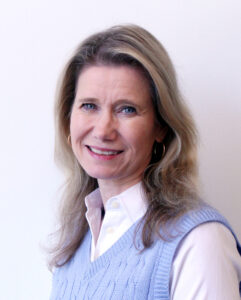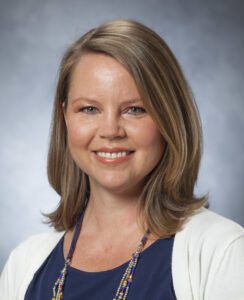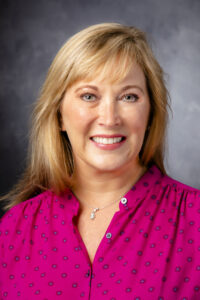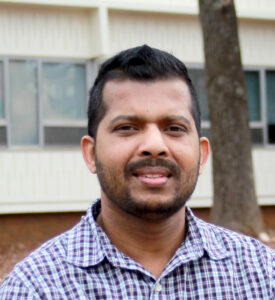The Creative Teaching Awards are presented annually on behalf of the Office of Instruction to faculty who have demonstrated exceptional creativity in using either an innovative technology or pedagogy that extends learning beyond the traditional classroom or for their creative course design or implementation of subject matter that improves student learning outcomes in their courses.
Lori Johnston
 Lori Johnston, a lecturer in the Grady College of Journalism and Mass Communication, has transformed JOUR 3090: Reporting I: Critical Skills for Reporting and Storytelling into a consistent and rigorous course that prepares students for careers in journalism. Each semester, she teaches 180 students how to report, write, and edit and builds their journalism skills through active learning opportunities such as mock press conferences and beat pitch competitions judged by professional editors and reporters. In spring 2023 she created a Beat Bingo game/exercise that encourages students to meet people on their reporting beats, seek out resources in and outside the college, and connect with faculty and former 3090 students. Johnston has also built valuable common resources for her students, including a web portfolio template in cooperation with the Center for Teaching and Learning that students will use throughout their academic career as well as a free, fully online textbook. Johnston has even created her own YouTube channel, “Skills for Storytelling and Reporting.”
Lori Johnston, a lecturer in the Grady College of Journalism and Mass Communication, has transformed JOUR 3090: Reporting I: Critical Skills for Reporting and Storytelling into a consistent and rigorous course that prepares students for careers in journalism. Each semester, she teaches 180 students how to report, write, and edit and builds their journalism skills through active learning opportunities such as mock press conferences and beat pitch competitions judged by professional editors and reporters. In spring 2023 she created a Beat Bingo game/exercise that encourages students to meet people on their reporting beats, seek out resources in and outside the college, and connect with faculty and former 3090 students. Johnston has also built valuable common resources for her students, including a web portfolio template in cooperation with the Center for Teaching and Learning that students will use throughout their academic career as well as a free, fully online textbook. Johnston has even created her own YouTube channel, “Skills for Storytelling and Reporting.”
Carol Britton Laws
 Carol Britton Laws, a clinical professor in the College of Family and Consumer Sciences, is the creator and founding director of Destination Dawgs, UGA’s inclusive transition program for young adults with intellectual disabilities. She created IHDD 2050S: Principles of Person-Centered Practices as a service-learning practicum class to teach undergraduate students about supporting people with disabilities. The course features online readings, videos, discussion, on-campus engagement, recorded journaling, and the completion of a final reflection paper. Students volunteer a minimum of 30 hours as peer mentors, applying person-centered support practices to assist students in the Destination Dawgs program. IHDD 2050S was intentionally created to promote active, experiential learning within the Disability Studies curriculum to improve critical thinking, problem-solving, and professional communication; all skills required of clinical professionals. In end-of-course evaluations, students say they are proud of their role in the successes of their mentees.
Carol Britton Laws, a clinical professor in the College of Family and Consumer Sciences, is the creator and founding director of Destination Dawgs, UGA’s inclusive transition program for young adults with intellectual disabilities. She created IHDD 2050S: Principles of Person-Centered Practices as a service-learning practicum class to teach undergraduate students about supporting people with disabilities. The course features online readings, videos, discussion, on-campus engagement, recorded journaling, and the completion of a final reflection paper. Students volunteer a minimum of 30 hours as peer mentors, applying person-centered support practices to assist students in the Destination Dawgs program. IHDD 2050S was intentionally created to promote active, experiential learning within the Disability Studies curriculum to improve critical thinking, problem-solving, and professional communication; all skills required of clinical professionals. In end-of-course evaluations, students say they are proud of their role in the successes of their mentees.
Leslie Gordon Simons
 Leslie Gordon Simons, professor of sociology in the Franklin College of Arts and Sciences, is transforming student happiness. Through innovative use of technology, she has designed a gamified simulation aimed at improving students’ engagement, application, and retention of material in her course, “SOCI 3710: The Science of Happiness.” The program focuses on life choices (e.g., use of leisure time, family arrangements, community characteristics) that students can make in order to improve well-being for themselves, their families, and communities. The program produces a happiness score for each student, together with a breakdown of the relative impact of how their choices influence their score. Real-time feedback allows students to understand the results of their decisions and makes the learning experience interactive and fun. Survey data collected at the beginning and end of the semester indicated that students felt less depressed, overwhelmed, anxious and tense by the end of the course.
Leslie Gordon Simons, professor of sociology in the Franklin College of Arts and Sciences, is transforming student happiness. Through innovative use of technology, she has designed a gamified simulation aimed at improving students’ engagement, application, and retention of material in her course, “SOCI 3710: The Science of Happiness.” The program focuses on life choices (e.g., use of leisure time, family arrangements, community characteristics) that students can make in order to improve well-being for themselves, their families, and communities. The program produces a happiness score for each student, together with a breakdown of the relative impact of how their choices influence their score. Real-time feedback allows students to understand the results of their decisions and makes the learning experience interactive and fun. Survey data collected at the beginning and end of the semester indicated that students felt less depressed, overwhelmed, anxious and tense by the end of the course.
Nandana Weliweriya
 Nandana Weliweriya, a lecturer in the department of Physics and Astronomy in the Franklin College of Arts and Sciences, has introduced problem-solving simulations and strategies in his physics classes to provide an immersive learning experience. He created interactive pre-lecture videos with embedded questions, encouraging active learning and deeper comprehension before students enter the classroom. Lab classes follow a three-part method: prediction, experiement, and data collecting. First, students engage with simulations to predict outcomes. Then, they perform laboratory experiments to test their hypotheses. Then, they have a recitation or problem-solving section to directly apply their acquired knowledge to original problems. The course focuses on hands-on skills and continuous improvement for each student. If students miss questions on midterm exams, they can record a video explaining their errors and correct solutions for partial credit. This deepens student understanding and helps students practice communication skills that will extend beyond their time at UGA.
Nandana Weliweriya, a lecturer in the department of Physics and Astronomy in the Franklin College of Arts and Sciences, has introduced problem-solving simulations and strategies in his physics classes to provide an immersive learning experience. He created interactive pre-lecture videos with embedded questions, encouraging active learning and deeper comprehension before students enter the classroom. Lab classes follow a three-part method: prediction, experiement, and data collecting. First, students engage with simulations to predict outcomes. Then, they perform laboratory experiments to test their hypotheses. Then, they have a recitation or problem-solving section to directly apply their acquired knowledge to original problems. The course focuses on hands-on skills and continuous improvement for each student. If students miss questions on midterm exams, they can record a video explaining their errors and correct solutions for partial credit. This deepens student understanding and helps students practice communication skills that will extend beyond their time at UGA.
